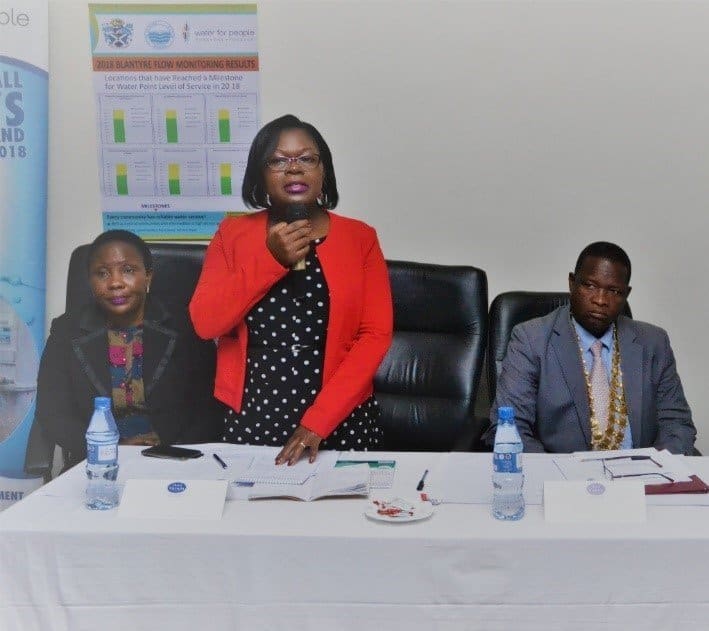
Kate Harawa making her opening remarks for the reflection session for Blantyre district in the presence of the Mayor for the City of Blantyre, His Lordhship Wild Ndipo, and the Regional Director of Water Supply and Sanitation from the Ministry of Agriculture, Irrigation and Water Development, Madam Phideria Moyo, in June 2017 (photo by Brian Mulenga).
Background: Water For People began working in Malawi in 2000, and has been a leader of the WASH systems strengthening approach since 2006. In Blantyre peri-urban district, Chikwawa district, and Chiradzulu district they support the district council to assess their WASH assets and services and prepare a full Life Cycle WASH plan. Using this Plan, Water For People is co-investing in new infrastructure, repairing and rehabilitating existing water points and kiosks, increasing access to sanitation through market-based approaches, and ensuring access to WASH services in schools and clinics. Below is an interview with Water For People Malawi’s Director of Influence and Scale.
Alec Shannon (AS), Content Strategist, Agenda for Change: Can you tell me about your new role as Director of Influence and Scale?
Kate Harawa (KH), Director of Influence and Scale, Water For People Malawi: The main goal is to take the understanding and learning that has been gained in Water For People’s Everyone Forever Districts, and use it to inform and influence other sector actors, especially government (local and national), to accelerate the achievement of SDG 6 in the country through strengthened WASH systems. Ultimately, we want to see systems in place all over Malawi and trained support staff available who can respond to issues in the absence of Water For People or other external support.
AS: In 2005, when you started with Water For People, what was the situation with water and sanitation services like in Malawi?
KH: Back then, we would visit districts and people would say “we need water,” and we were responding to this need without taking any sort of assessment. We quickly realized we could not continue working like this; so, in 2006, we decided to focus on a specific location and start a data-driven approach. As we started to collect data, we realized there were gaps: there was a lot of investment going into new infrastructure, but there was also existing, non-functioning infrastructure, and there was nobody, no system, to repair it or make it functional again. We started thinking, “we need to do something about this.”
AS: Can you tell me about the project in Blantyre that you undertook with the European Investment Bank?
KH: From 2009 to 2013, we worked with the European Investment Bank (EIB) and the Blantyre Water Board. The project was initially designed to put in new infrastructure. When we looked at the proposal, we said we want to do something different. We want to put systems in place so that all existing, non-functioning water points will be put into functional condition. Also, the new ones we install must continue to function and provide service once the project ends. Similarly for sanitation, we said we are not going to build toilets for people, instead; we will help build a system for entrepreneurs to come in and start building the toilets and provide pit emptying services, and people will know who to get those services from. And during that period, we were able to do that.
AS: What are your next steps to reach SDG 6 by 2030 in Malawi?
KH: So far, we have managed to reach every community with access to water in Blantyre, and there are trained entrepreneurs who are supplying sanitation products and providing pit emptying services. The remaining questions for us are: how can the city authorities continue to provide direct support services? Also, are there any gaps? We are considering these questions in each district, and we are trying to see how best they can be helped to move forward.
Then there’s one part where we have not even reached Everyone, Forever, which is on public institutions. So, not all the schools and health clinics have been reached yet in Blantyre.
AS: Do you have any advice or tips for those who are just starting with systems strengthening?
KH: Start the discussions early on about the financing that is needed to keep the services working beyond the project period. Don’t forget the importance of making sure that the government is taking the lead and taking ownership, at all levels.
Finally, there is a saying that if you do not measure something, then you will not know how deep, how tall, or how long that thing is; in that regard, keep on monitoring the status of the system so that we can continuously improve. The more we collaborate and have a common way of measuring things, the more likely we can move forward together and align our approaches.
—
Kate Harawa is Director of Influence and Scale with Water For People Malawi. She is passionate about improving the quality of life of all people, and especially girls, women, and children, by helping them realize their potential and contributing to their development. In Africa and Malawi, women and girls are the key stakeholders in WASH, hence her work in WASH directly impacts on these groups. Before coming to Water For People, Kate also worked on environment and health related projects with Canadian Physicians for Aid and Relief and OXFAM.
